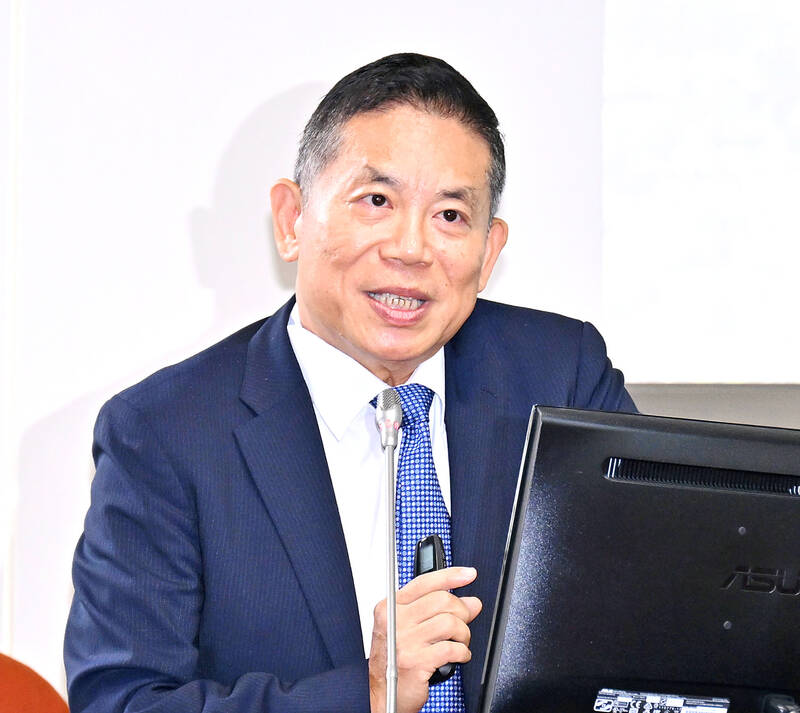The development of decarbonized hydrogen technology would help Taiwan meet its energy needs and nuclear-free target, National Development Council (NDC) Minister Paul Liu (劉鏡清) told lawmakers at the Legislative Yuan’s Economics Committee in Taipei yesterday.
Liu, a former chairman of PwC Taiwan’s Business Consulting Services, said there is no need to dwell on the energy-mix issue, as the nuclear-free policy is doable with the development of “green hydrogen.”
“The Cabinet is giving its top priority to ensuring sufficient electricity supply while seeking to reduce carbon emissions and fulfill the net carbon goal toward 2050,” Liu said, adding that a decarbonized hydrogen technology being developed by Academia Sinica is a potential solution for Taiwan and the rest of the world.

Photo: Fang Pin-chao, Taipei Times
Hydrogen used by other countries still has pollution concerns, but the decarbonized technology would break natural gas into carbon and hydrogen, and then burn the hydrogen to generate electricity, Liu said.
Academia Sinica is experimenting with a process by which thermal energy is applied to methane to crack the chemical bond between the carbon and hydrogen comprising natural gas, generating hydrogen gas and a solid carbon product without carbon emissions, a Ministry of Economic Affairs task force said earlier.
The task force comprises representatives from government ministries, as well as Taiwan Power Co (台電), CPC Corp, Taiwan (台灣中油) and China Steel Corp (中鋼), the Energy Administration has said.
Importing and producing hydrogen are potential strategies, with the goal for hydrogen to account for 9 to 12 percent of Taiwan’s energy mix, the Energy Administration said.
The development of artificial intelligence applications would increase the nation’s power consumption by 30 percent and sectors appear to care more about whether there is sufficient electricity supply rather than energy origins, Liu said.
Liu said he has no objection to nuclear power plants, if they meet safety and environment protection requirements, and there is the imminent threat of an electricity shortage.
However, extending the lifetimes of nuclear power plants and building new ones would first require the removal of legislative obstacles, a process that could take several years, and that is without factoring in societal resistance, he said.
The government has no intention of ditching the effort to make Taiwan nuclear-free while supporting economic growth, he said.
It would take another five years to complete the decarbonized hydrogen technology, while it would not enter commercial use until at least 2035, Liu said, citing Academic Sinica.

CLASH OF WORDS: While China’s foreign minister insisted the US play a constructive role with China, Rubio stressed Washington’s commitment to its allies in the region The Ministry of Foreign Affairs (MOFA) yesterday affirmed and welcomed US Secretary of State Marco Rubio statements expressing the US’ “serious concern over China’s coercive actions against Taiwan” and aggressive behavior in the South China Sea, in a telephone call with his Chinese counterpart. The ministry in a news release yesterday also said that the Chinese Ministry of Foreign Affairs had stated many fallacies about Taiwan in the call. “We solemnly emphasize again that our country and the People’s Republic of China are not subordinate to each other, and it has been an objective fact for a long time, as well as

‘CHARM OFFENSIVE’: Beijing has been sending senior Chinese officials to Okinawa as part of efforts to influence public opinion against the US, the ‘Telegraph’ reported Beijing is believed to be sowing divisions in Japan’s Okinawa Prefecture to better facilitate an invasion of Taiwan, British newspaper the Telegraph reported on Saturday. Less than 750km from Taiwan, Okinawa hosts nearly 30,000 US troops who would likely “play a pivotal role should Beijing order the invasion of Taiwan,” it wrote. To prevent US intervention in an invasion, China is carrying out a “silent invasion” of Okinawa by stoking the flames of discontent among locals toward the US presence in the prefecture, it said. Beijing is also allegedly funding separatists in the region, including Chosuke Yara, the head of the Ryukyu Independence

UNITED: The premier said Trump’s tariff comments provided a great opportunity for the private and public sectors to come together to maintain the nation’s chip advantage The government is considering ways to assist the nation’s semiconductor industry or hosting collaborative projects with the private sector after US President Donald Trump threatened to impose a 100 percent tariff on chips exported to the US, Premier Cho Jung-tai (卓榮泰) said yesterday. Trump on Monday told Republican members of the US Congress about plans to impose sweeping tariffs on semiconductors, steel, aluminum, copper and pharmaceuticals “in the very near future.” “It’s time for the United States to return to the system that made us richer and more powerful than ever before,” Trump said at the Republican Issues Conference in Miami, Florida. “They

GOLDEN OPPORTUNITY: Taiwan must capitalize on the shock waves DeepSeek has sent through US markets to show it is a tech partner of Washington, a researcher said China’s reported breakthrough in artificial intelligence (AI) would prompt the US to seek a stronger alliance with Taiwan and Japan to secure its technological superiority, a Taiwanese researcher said yesterday. The launch of low-cost AI model DeepSeek (深度求索) on Monday sent US tech stocks tumbling, with chipmaker Nvidia Corp losing 16 percent of its value and the NASDAQ falling 612.46 points, or 3.07 percent, to close at 19,341.84 points. On the same day, the Philadelphia Stock Exchange Semiconductor Sector index dropped 488.7 points, or 9.15 percent, to close at 4,853.24 points. The launch of the Chinese chatbot proves that a competitor can